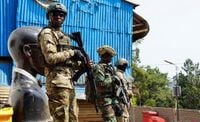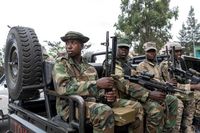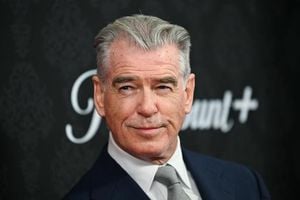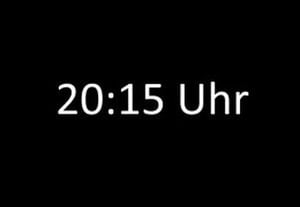The Democratic Republic of Congo (DRC) continues to grapple with a tense situation as military and political maneuvers unfold in the eastern region, particularly surrounding the rebel group M23. On March 23, 2025, the Congolese military announced its intention to observe a ceasefire amidst an escalating conflict ignited by M23's advance and seizure of key territories.
Just a day prior, on March 22, M23 rebels declared their withdrawal from the captured mining town of Walikale and its surrounding areas in North Kivu province. This announcement came following mediation efforts between DRC President Felix Tshisekedi and Rwandan President Paul Kagame, which were facilitated by Qatar’s Emir on March 18 in Doha. The Congolese military confirmed it would also abide by the ceasefire and encouraged local defense forces to do the same to foster peace talks and support the ongoing dialogue processes initiated in Luanda and Nairobi.
In their statement, the Congolese army made it clear that while they are willing to pause military operations, they reserve the right to intervene should any hostile actions jeopardize the security of local populations or the integrity of Congolese territory. The M23, which has been at the center of conflict in eastern DRC, previously intensified its offensive in December, taking over major cities, including Goma and Bukavu. This aggressive expansion has led to a surge in civilian displacement, with over 100,000 fleeing to neighboring countries as reported by the UN.
The situation raises questions about the commitment of the M23 rebels to peace and the Congolese government’s response to these evolving dynamics. On the same day as the military’s ceasefire announcement, M23 leaders said that their repositioning of forces was in alignment with ongoing peace initiatives. They acknowledged that the decision to withdraw troops from Walikale was aimed at creating conditions favorable for peace efforts and dialogue.
Foreign Affairs Minister Thérèse Kayikwamba Wagner expressed cautious optimism regarding the M23’s intentions, stating that the DRC would be observing whether this withdrawal would indeed lead to a commitment to dialogue and peace. “We are going to see whether M23 will withdraw from Walikale and whether M23 will give priority to dialogue and peace,” she stated. Yet skepticism remains among military officials regarding the trustworthiness of the rebel group. An anonymous Congolese army officer expressed doubts about the M23's actual intentions, claiming the rebels were advancing toward another town, Mubi, despite the announced withdrawal.
Additionally, the M23's strategic positioning continues to place it within proximity of critical urban centers in eastern Congo, including Kisangani, the country’s fourth largest city located approximately 400 km from Walikale. Observers and residents alike are wary about what might happen should the M23 truly execute their pledge to withdraw while emphasizing that the groups' earlier capitulation to hostilities remains fresh in their minds.
The DRC government has indicated a willingness to engage in dialogue with M23—an approach that contrasts with its historically rigid stance of refusal to negotiate. Minister Wagner highlighted this shift, noting, “We have long maintained that direct negotiations with the M23 should not be our priority... but the conflict’s evolution necessitates that we be adaptive in our approach.”
This official statement underscores the complexities of navigating a conflict rooted deeply in historical grievances, particularly stemming from regional fallout related to Rwanda’s 1994 genocide and ongoing competition for mineral wealth. Efforts to de-escalate the conflict continue amidst calls for international awareness and involvement; the Congolese government’s recent calibrations hint at an understanding that lasting solutions require compromises and dialogue.
However, M23 leader Corneille Naanga remains firm on negotiations, declaring their demand for direct discussions with the Congolese government is vital for resolving the ongoing strife. Recent calls for an immediate ceasefire, issued jointly by Congo and Rwanda, have been dismissed by the M23, which implies that genuine dialogue may need to overcome numerous hurdles of distrust.
Thus, as the Congolese military and government strive for stability amid turmoil, the focus turns to how these recent actions and statements will translate in tangible steps toward lasting peace. The ceasefire could provide a framework for rebooting negotiations, but as the conflict has many players with varied interests, a comprehensive solution necessitates earnest cooperation and commitment from all involved parties.
With significant loss of life, civilian suffering, and political complexities, the road ahead for DRC appears fraught with challenges. Local populations await meaningful resolutions that not only halt the violence but also lay the groundwork for future coexistence and stability in a region marked by decades of strife.





